hankyoreh
Links to other country sites 다른 나라 사이트 링크
In Itaewon tragedy, mourning is not enough
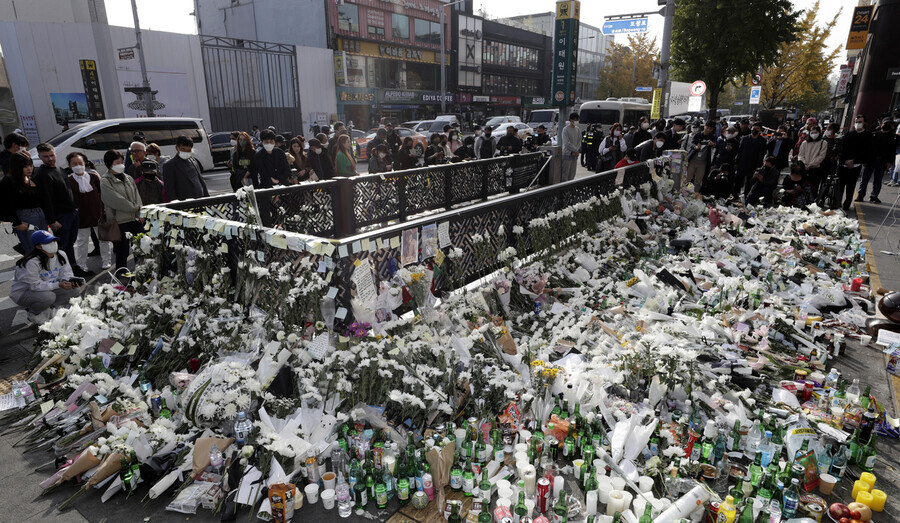
1:30 am. The streets of Itaewon, which had been full of screams and sobs earlier in the day, were now eerily quiet.
Itaewon is somewhere that has had its fair share of incidents and accidents owing to its nature as a place people go to have fun. But it had never had to face so many deaths in such a short amount of time.
Bodies draped with blue blankets were carried out of dark alleys. The police, rescue teams, witnesses, and reporters; many were present at the scene, but everyone was at a loss for words.
“How is this happening?”
After staring at his friend standing next to him, a young man in his 20s broke the silence. There were still remnants of fake blood on his face, to add to the Halloween festivities. I flinched at first, thinking that those wounds were caused by the accident. I could soon see that it was makeup, however, because I could see that the makeup was getting blurred from the various tear marks that had soon dried up.
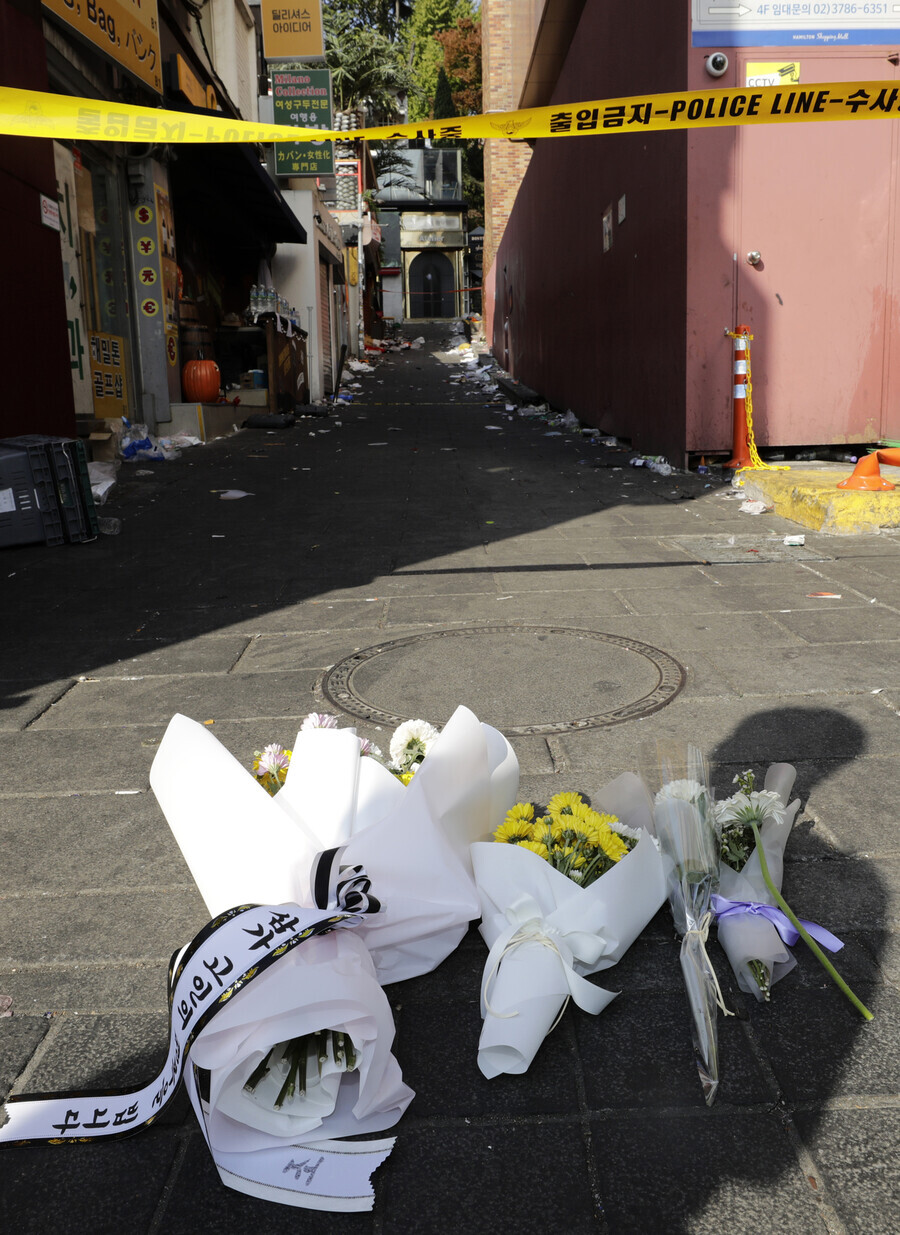
Is wanting to have fun so wrong? That night, dumbstruck young people meandered around with no clear destination. The sound of vomiting and the occasional sob could be heard. I met some young survivors, crouched over, waiting for the sun to rise in the basement of a building I entered to organize my coverage notes. “I only came to have fun…” They clung on to their phones and burst into tears, as if they were pleading to someone. The never-ending night was one full of terror.
I received a phone call telling me to go cover the scene at a little over midnight on Oct. 29. Worrying rumors that had been posted the night before on various social media had become reality. I rushed to take a taxi and I arrived at my destination; a place familiar to me.
However, the air of the neighborhood was one that I’d never felt before. People crying as they walked, water bottles and shoes flung carelessly all over the streets, limp limbs dangling from underneath blankets. The incident, in an instant, changed everything that the street signifies.
As of the night of Oct. 29, Koreans can now imagine a new disaster scenario. In the middle of a large city, with tall buildings everywhere and cars going to and fro. A place that is usually full of people going around living their ordinary lives. No landslides, floods, or earthquakes were involved in the deaths of 156 people. They died helplessly while standing in a crowd. The fun and games that usually accompany an ordinary evening collapsed in an unexpected place.
The shock of witnessing a catastrophe in a place where one would least expect it was great.
Many tried to make sense of this unprecedented incident, trying to think about where everything went wrong. If the cause of a disaster cannot be identified, people will start to think that one day, they’ll be the victims, which results in amplified anxiety.
In an attempt to find the cause of this bewildering disaster, the blame started to turn to the victims and the survivors, who “created” this exceptional situation. Is that why? The bereaved families explained why the victims were at Itaewon that day. “They needed a breather after all of that studying,” “The work they do is a solitary one, so they wanted to go somewhere full of crowds and life…”
As such, the seed of guilt started to get planted without any clear evidence. But why is it wrong for youth to step outside their houses to have fun? Many of the youth who died or were hurt during this incident witnessed the Sewol ferry disaster as students. They are part of a generation who had school trips and other various group events canceled over safety issues and had to spend most of their childhood holding their breath in a rigid society that had started to fear for public safety. Any sort of social gatherings for entertainment were clenched shut for the past three years due to the COVID-19 pandemic. At one point it was considered a sin to gather in large groups to enjoy performances or engage in any sort of culture or to even meet up in small groups with friends to chat.
In the memorial site that has been set up at Noksapyeong Square, citizens shed endless tears.
“I live nearby, so I pass by that street a lot. I keep thinking about whether I should’ve gone outside with a bottle of water. It could’ve been me, but I wasn’t able to do anything.”
A person surnamed Kim, in their 20s, said that the guilt they feel from not having done more weighs heavily on them every night.
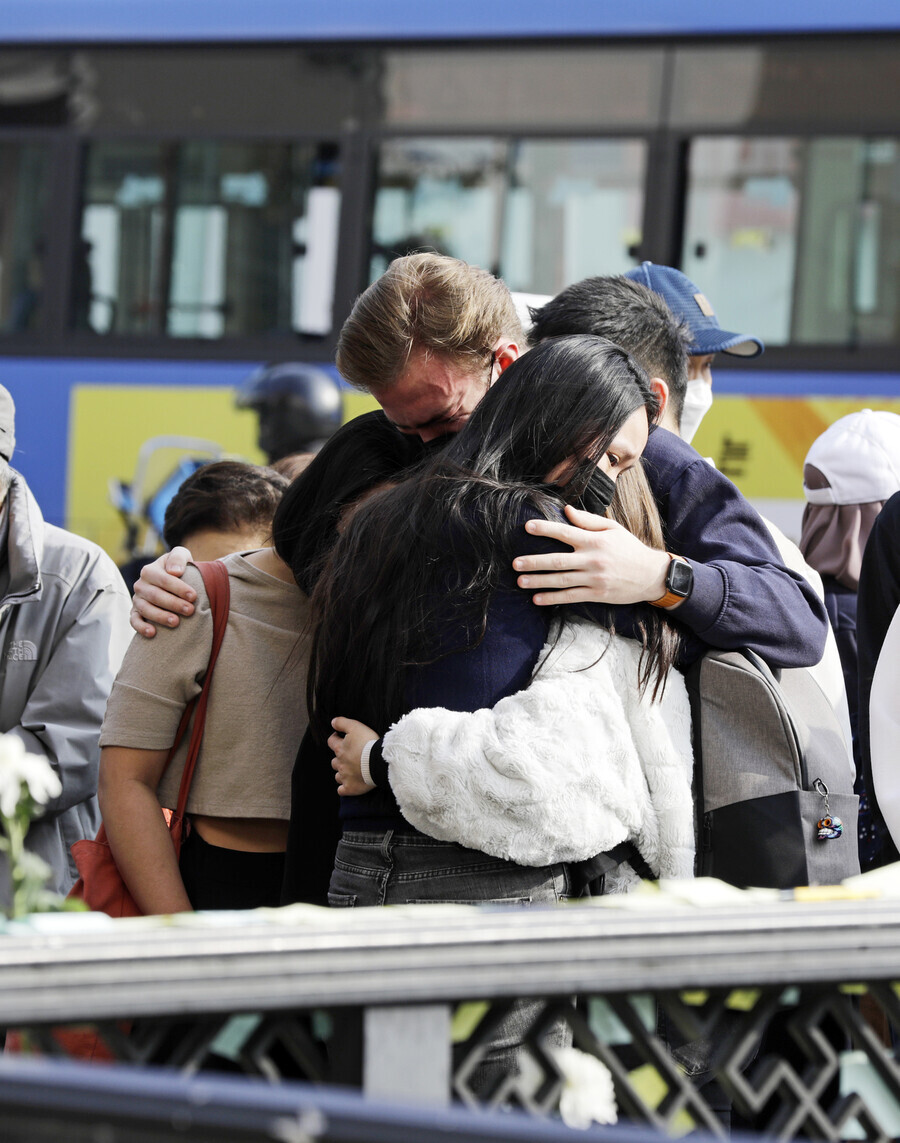
In the face of the disaster that night, they did not do anything shameful enough to warrant guilt. Many citizens tried their best to keep death at bay, but it was just not enough. Shim Yoon-hee (22), who sprayed water and performed CPR with her friends in Itaewon on the day of the incident, says that she cannot sleep at night because of what she remembers from the scene.
“Everyone there tried to help. Really, everyone. But we already missed the ‘golden time,’” Shim said, trying to hold back tears. “I feel like crying right now is hypocritical. At least I’m alive.” It’s gotten to the point where they are blaming themselves for being alive.
A video of a police officer shouting at the top of his lungs and tearing up in the middle of the crowd at the hectic scene drew lots of attention. Sergeant Kim Baek-gyeom of the Itaewon police box, who tried to rescue people and control the streets at the scene of the tragedy said in an interview with Hankyoreh, “I keep regretting the decisions I made. If I had made a better decision, I could’ve saved one more person. I keep thinking about that. Those who did their best to help at the scene were just not strong enough to control the massive calamity, but they’re the only ones who’re covered in a shadow of guilt.
Despite everything, the state does not appear to have qualms about its failure to be responsible. Four hours before the disaster, 11 reports signaling the severity of the situation were received — with some reports saying that “they felt like they were being crushed to death” — but police were only deployed to four of those reports.
Citizens understood the danger of the situation and asked for help, but the state turned a blind eye. This is the first piece of evidence that shows that the state abandoned its duty to protect its people.
How have those in positions in which they should feel responsible for the disaster responded to the tragedy? Under the direction of the Prime Minister’s Office, the government has ordered for the universal use of terms for the incident: the “Itaewon disaster” should be dubbed the “Itaewon accident,” and the “victims” should be the “deceased and injured.” Lee Sang-min, minister of the Interior and Safety stated that the Itaewon disaster is “not something that could have been solved by positioning more police and firefighters ahead of time.” Park Hee-young, head of Yongsan District Office drew a line by saying that the district office did everything in its power.
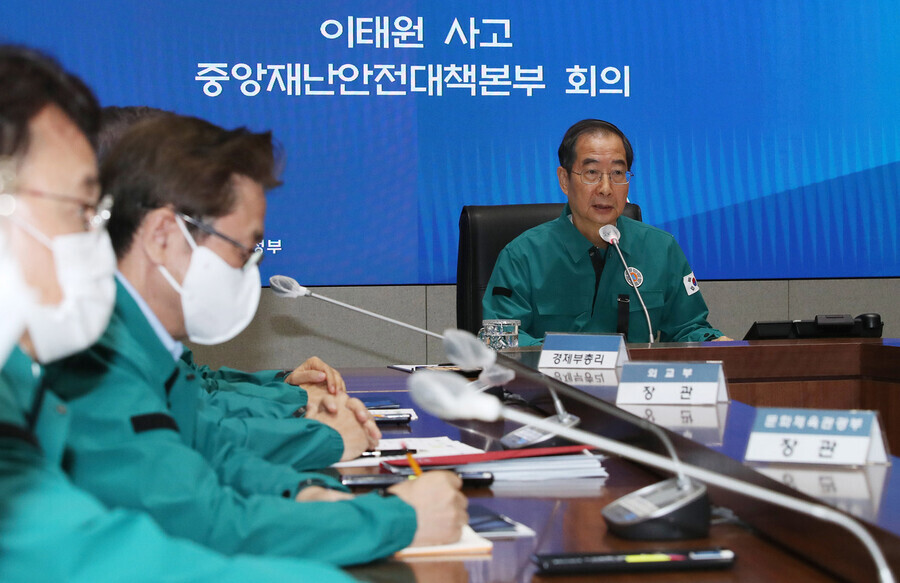
In some cases, they responded to demands to take responsibility with jokes. In a foreign press conference about the Itaewon disaster held on Tuesday, Prime Minister Han Duck-soo, after being told that there was a problem with the interpretation, made a joke and laughed, saying, “Where does the responsibility of someone responsible for this audio issue begin and end?” The question was a riff off a question he had just received, where someone asked him “where the Korean government’s responsibility begins and ends, especially in a situation that seems to be no one’s fault.”
As such, no one is trying to relieve the guilt of the witnesses and survivors. Instead, the government is trying to make up for the lack of responsibility with “mourning.” Mourning is an act of “expressing sorrow over people’s deaths.” By emphasizing the sorrow surrounding this situation, the government is trying to silence people. Public officials have been told to put on black ribbons, and the government has been telling people to stop politicizing and criticizing the current situation in this period of mourning.
The day after the incident, many of the shops along the streets of Itaewon were closed. Notes were put on those tightly closed glass doors saying, “We grieve deeply and mourn the victims.” I went into one shop. When I commented on how many of the shops in the vicinity had closed for the day, the manager of this shop avoided eye contact. “I still need to survive,” he said.
As he hurried into the kitchen, I couldn’t help but think about the image of his back for a long time. There are some whose livelihoods are being threatened because they are being asked to “prove” their grief. In the face of terrible death, citizens are embarrassed to do what they normally do to earn their living.
The third day of coverage arrived in this oppressing atmosphere that seemed to not be resolved. No mortuaries have been set up in hospitals yet. Some have had to leave their families in the morgue, and some have had to go to different places such as Ilsan, Uijung-bu, and Yangju to find hospitals that weren't full.
I could hear the crying of bereaved family members asking why their children were sent so far. While funeral homes were full, the minds of the survivors were emptied, leaving a gap in which a feeling of lethargy entered.
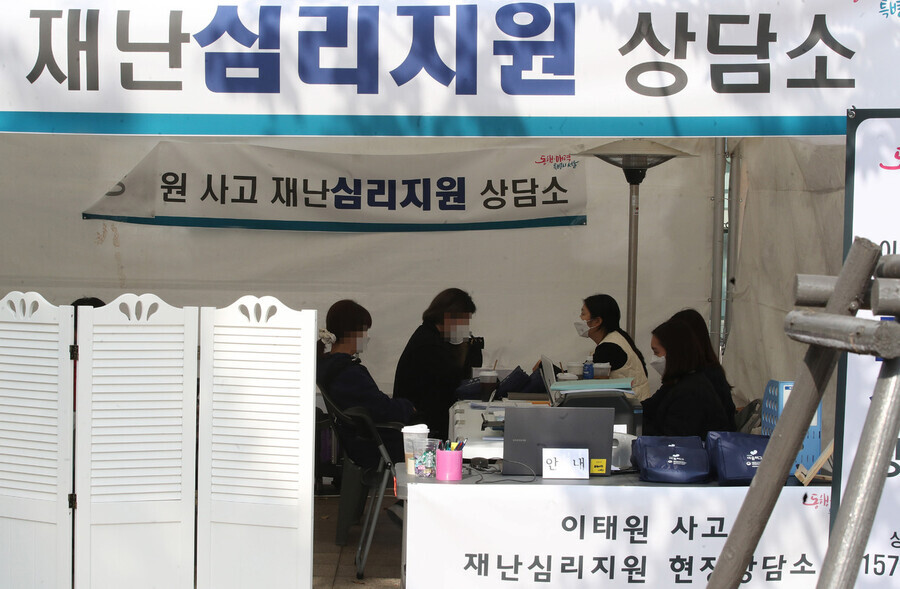
People are trying their best to avoid falling into lethargy in the midst of this massive loss. When recalling the Halloween deaths, some may try to keep a distance from others when riding crowded subways during rush hour while others are determined to learn CPR to be better prepared for another disaster.
The end result of this accident shouldn't be for each person to suffer from a serious bout of PTSD in vain.
Am I entitled to suffering even though I was not directly involved? Having to face resentful gazes, is my mind, which has been so overtaken by death, still intact? I ended up relying on the colleagues who witnessed what had happened in Itaewon with me.
In the alley behind the dreary scene of the accident, in a hospital where we had to sit like sinners, at a memorial altar full of people with red, tear-filled eyes, I greeted my colleagues with an “Are you okay?”
It was a great comfort to have people with whom I could share the heavy feelings in my heart that I couldn't freely show or express otherwise. Maybe the citizens who have been suffering from watching this huge tragedy unfold have also already become like colleagues, who share the same thoughts and feelings as me.
Now all that is left to do is to hold the state accountable for not doing its best. From 2 to 59 and then from 120 to 156. The number of deaths written on the electronic board was constantly changing. Although the shame is irreversible, it is up to those who are still alive to make sure such a tragedy is not repeated.
Despite having been discouraged by the police, a vendor in Itaewon set up a memorial altar table for the victims and insisted that they should “at least be fed one meal.” The gesture must have come from pent-up anger and a feeling of having to do at least something despite feelings of sadness and self-deprecation.
Drowning in lethargy and guilt is not the only way to mourn. The people will no longer tolerate an irresponsible state.
By Kim Ji-eun, staff reporter
Please direct questions or comments to [english@hani.co.kr]

Editorial・opinion
![[Column] Season 2 of special prosecutor probe may be coming to Korea soon [Column] Season 2 of special prosecutor probe may be coming to Korea soon](https://flexible.img.hani.co.kr/flexible/normal/500/300/imgdb/original/2024/0426/3317141030699447.jpg) [Column] Season 2 of special prosecutor probe may be coming to Korea soon
[Column] Season 2 of special prosecutor probe may be coming to Korea soon![[Column] Park Geun-hye déjà vu in Yoon Suk-yeol [Column] Park Geun-hye déjà vu in Yoon Suk-yeol](https://flexible.img.hani.co.kr/flexible/normal/500/300/imgdb/original/2024/0424/651713945113788.jpg) [Column] Park Geun-hye déjà vu in Yoon Suk-yeol
[Column] Park Geun-hye déjà vu in Yoon Suk-yeol- [Editorial] New weight of N. Korea’s nuclear threats makes dialogue all the more urgent
- [Guest essay] The real reason Korea’s new right wants to dub Rhee a founding father
- [Column] ‘Choson’: Is it time we start referring to N. Korea in its own terms?
- [Editorial] Japan’s rewriting of history with Korea has gone too far
- [Column] The president’s questionable capacity for dialogue
- [Column] Are chaebol firms just pizza pies for families to divvy up as they please?
- [Column] Has Korea, too, crossed the Rubicon on China?
- [Correspondent’s column] In Japan’s alliance with US, echoes of its past alliances with UK
Most viewed articles
- 1No good, very bad game for Korea puts it out of Olympics for first time since 1988
- 2[Column] Season 2 of special prosecutor probe may be coming to Korea soon
- 3Korea’s 1.3% growth in Q1 signals ‘textbook’ return to growth, says government
- 4‘We must say no’: Seoul defense chief on Korean, USFK involvement in hypothetical Taiwan crisis
- 5Is N. Korea threatening to test nukes in response to possible new US-led sanctions body?
- 6Division commander ordered troops to enter raging flood waters before Marine died, survivor says
- 7[Column] ‘Choson’: Is it time we start referring to N. Korea in its own terms?
- 8Will NewJeans end up collateral damage in internal feud at K-pop juggernaut Hybe?
- 9Korea sees more deaths than births for 52nd consecutive month in February
- 10[Editorial] Korea’s surprise Q1 growth requires objective assessment, not blind fanfare